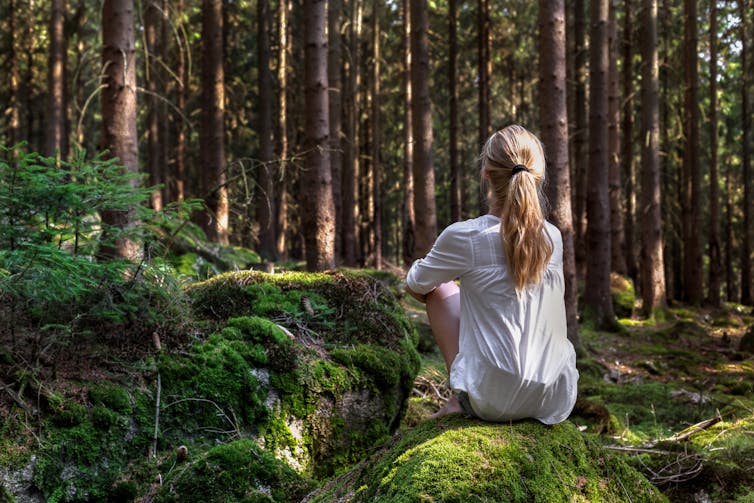Every day, we are bombarded with messages about a world in crisis. Alongside the ongoing reminders of wars, economic recessions and social unrest is news about natural disasters and extreme weather – be that prolonged droughts, freak heatwaves and wildfires or devastating floods and landslides.
It’s possible that our growing awareness of climate issues may arise from the overreporting of negative news in a media-fuelled and hyperglobalised world. But what’s happening to our environment also appears unprecedented. Global sea levels rose two-and-a-half times faster between 2006 and 2016 than they did throughout nearly the whole 20th century, and climate-related disasters have tripled over the past three decades.
Many people are becoming understandably anxious. This is especially true for young people, who have their whole lives ahead of them on a planet inherited from those who, generally speaking, have neglected to care for it. A YouGov poll from 2020 found that 70% of 18–24 year olds were worried about the environment.

This article is part of Quarter Life, a series about issues affecting those of us in our twenties and thirties. From the challenges of beginning a career and taking care of our mental health, to the excitement of starting a family, adopting a pet or just making friends as an adult. The articles in this series explore the questions and bring answers as we navigate this turbulent period of life.
You may be interested in:
Three ways to get your nature fix without a garden
Three mindfulness and meditation techniques that could help you manage work stress
How to rewire your brain to feel good on Mondays
Worrying can be a problem when it becomes overwhelming and prevents you from living your life. Studies have shown that climate anxiety (distress about climate change and its impacts on the planet, future disasters and the future of human existence) can lead to shortness of breath, worsen physical health and interfere in social relationships or functioning at school or work.
The growing awareness of this emerging mental health issue has led to some suggestions on how to cope with climate anxiety. We can take action by recycling more, buying goods with less packaging or cutting down on consumption and waste. No matter how small they seem, actions like these can promote conversations and awareness and prompt more substantial lifestyle shifts.
Nevertheless, some people may find it hard to manage their emotions, especially younger people who have, according to research, less control of their feelings. Trying to reduce your carbon footprint might also feel too trivial to convince yourself that any actual difference will be made.
One potentially more engaging and effective way to cope with the anxiety brought on by the climate crisis is community gardening. This is an activity where people come together to harvest and maintain plants and crops on designated plots of land.
In 2018, the Woodland Trust (the UK’s largest woodland conservation charity) set up the UK’s first Young People’s Forest in Derbyshire. The project involved enlisting schools, scout groups and other young people to cultivate the area, resulting in the planting of 250,000 trees.
The young volunteers who participated expressed that these activities helped “massively” in reducing their climate anxiety.

In it together
Community gardening is beneficial because it allows people to deal directly with their climate concerns by doing good for the environment. The act of planting, for example, makes a tangible difference. Growing flowers that attract bees can make you feel like you’ve done something good for the ecosystem.
Gardening – whether it involves digging, sowing or harvesting – is also inherently good for your physical and mental health. Research has even likened getting your hands dirty in the garden to a natural anti-depressant. Contact with a soil bacterium called Mycobacterium vaccae can trigger the release of serotonin, while foraging in a garden leads to more dopamine in the brain (both of which are hormones associated with feelings of happiness).
Community gardening also requires collective planning and cooperation. Working towards shared goals can foster a sense of togetherness.
A feeling of deep connection may develop not just with others, but with nature as a whole. Research on residents in Singapore suggests that people who garden frequently are more likely to self-identify with nature and care for it.
Immersed in nature
Engaging in community gardening also encourages people to spend more time in nature. Even something this simple has several health benefits.
In 1982, the Japanese Ministry of Agriculture, Forestry and Fisheries introduced the therapeutic practice of “shinrin-yoku”, the Japanese ritual of forest bathing or immersing oneself in the presence of trees. Since then, it has formed part of Japan’s public health programme. It was developed as a response to the substantial rise in anxiety and stress-related illness brought about by rapid urbanisation and long working hours.
Wood, plants and some fruit and vegetables emit essential oils – generally called phytoncide – as a natural defence against germs and insects. Inhaling phytoncide seems to improve the ability of the immune system to function. And research from Chiba University in Japan has demonstrated that spending just 30 minutes in the company of trees exhibited reduced concentrations of cortisol (a stress hormone), pulse rates and blood pressures.

Community gardening could emerge as an effective method for addressing climate anxiety. It is fun and engaging, allows people to feel like they are making a direct impact on the environment and carries plenty of physical health benefits.
In this way, people can maintain a healthy concern about climate change, which is necessary for positive steps to be taken in order to protect our planet, without tipping over the edge into climate anxiety.

